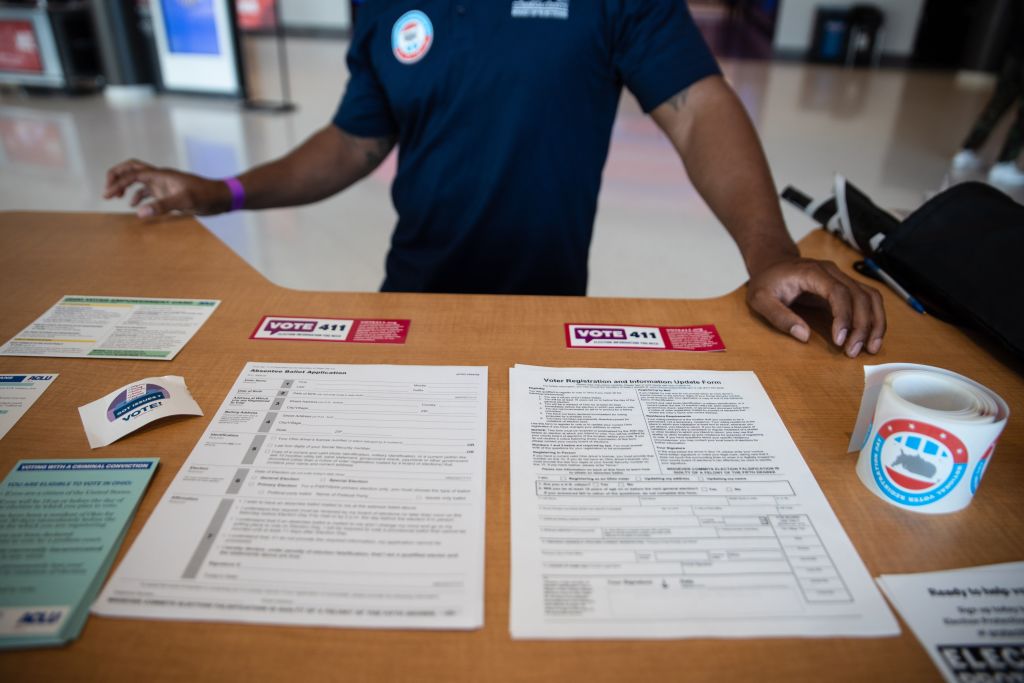Unlike other magazines, The Spectator doesn’t feel compelled to tell people how to vote. We try not to endorse candidates in elections. Our writers adopt different positions and our readers are, on the whole, adults who can think for themselves. But The Spectator would like to make one appeal in this tumultuous year: for America to keep faith in democracy.
No matter which candidate emerges triumphant, America looks certain to face a real crisis of democratic legitimacy after November 3. Donald Trump deserves some blame for this turn of events. While Trump has not been one-tenth of the tyrant his enemies accuse him of being, he has toyed with the idea of not accepting the results and even riffed wildly about sabotaging mail-in voting or moving the date of the election.
Trump supporters have come to accept that the President’s more spontaneous remarks are usually not serious, or at least not likely to be fulfilled. But at this challenging moment, America would benefit greatly from a president who recognizes the gravity of what he says and so says less.
Still, it would be dishonest for The Spectator to take the supercilious position of blaming both parties equally for our present problems — especially this year when, for the first time in living memory, the Democrats’ campaign pitches include not only promises about what they will do if they win but threats as to what will be done if they lose.
;768:[300×250,336×280,320×100];0:[300×250,320×100,320×50]”]For three months, partisans of the left have wrought one riot after another in cities across America. With millions of Americans fearful that urban violence may spread to their neighborhoods, Joe Biden says that President Trump is to blame because he ‘fomented’ it.
Whatever the shortcomings of President Trump’s governance, only the delusional would believe that Trump supporters are the ones making city dwellers live in fear. Biden’s claim is that Trump is so odious that Democratic partisans can’t help looting stores, burning cars and attacking police as a form of prolonged protest against him.
‘Does anyone believe there will be less violence in America if Donald Trump is reelected?’ Biden asked on August 31, showing devastating mastery of his teleprompter. It was a critique of Trump’s ability to govern, but the remark carried with it a whiff of extortion: elect Joe Biden or suffer four years of anger in the streets.
Democrats laid the groundwork for this four years ago. Rather than accept defeat in 2016, the party spent four years promoting a conspiracy theory that Russia had rigged the vote for Trump. In 2018, party leaders promoted Stacey Abrams’s claim to be the ‘real’ governor of Georgia, robbed of office by ‘voter suppression’, even though the election she lost had one of Georgia’s highest-ever turnouts. Now, regardless of the turnout on November 3, Democrats are primed to label the outcome a result of more ‘suppression’; of the hijacking of the US Postal Service; or of more Russian malevolence.
Back in August, Hillary Clinton said that ‘Joe Biden should not concede under any circumstances’. It’s no exaggeration to say that such talk puts American democracy in peril. Not from a foreign invader, not from the coronavirus, but from the steady decline in the willingness of the nation’s political factions to tolerate one another and concede to each other the right to govern. The ceasefire of enlightenment liberalism, the promise to live and let live rather than treat every political battle as an all-out war to the death, is breaking down.
;768:[300×250,336×280,320×100];0:[300×250,320×100,320×50]”]Gone is the norm of voting in person on a single day and having the results tallied and announced that night. Instead, with Americans already cynical about the intentions of their leadership class, the Democrats are using the oversold coronavirus threat to erect a new system of widespread mail-in voting, which for some reason requires counting that could take days, even weeks.
Already mail-in ballots are being contested. Already it is predicted that, thanks to a partisan division between Election Day voters and mail-in voters, election-night results could heavily favor President Trump before swinging against him in the days that follow.
Such an outcome would make a valid election almost indistinguishable from intentional fraud and virtually guarantee that half the country views the winner as illegitimate. Instead of abhorring this scenario, leaders seem to be hurtling toward it, seemingly indifferent to the calamity it could create.
Over the summer, Hillary Clinton’s campaign chairman, John Podesta, joined a collection of Democrats and anti-Trump Republicans to ‘war-game’ the 2020 election. (Now that these people are no longer in a position to make America invade other countries, they have to act out conflict fantasies at home. That’s what people mean by ‘blowback’.)
Podesta played the role of Joe Biden in a scenario in which he lost the election the same way Hillary Clinton did four years ago: winning the popular vote but losing the Electoral College. Podesta refused to accept the result, claiming ‘voter suppression’ had made the vote illegitimate. He ignited a secession crisis by urging West Coast states to leave the Union rather than endure a second Trump term. For the sake of power, Podesta chose to rip apart America’s constitutional fabric, permanently.
Just a fanciful game? Perhaps. One month from now, however, one half of America’s leadership class could face the same dilemma Podesta did. It is crucial that they make a different choice.
;768:[300×250,336×280,320×100];0:[300×250,320×100,320×50]”]This article is in The Spectator’s October 2020 US edition.

























